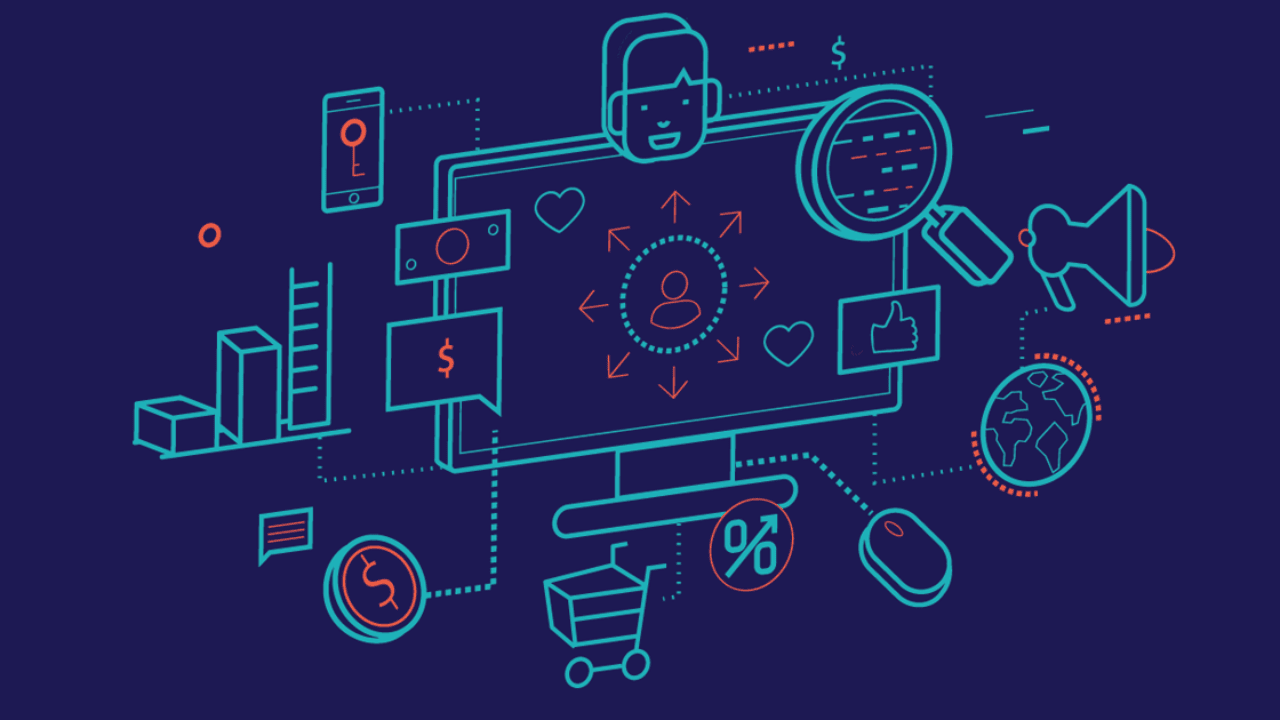The Revolution to Take Back Privacy
The digital marketing industry has evolved significantly over the past decade and it is undergoing a major transformation that is being influenced by Blockchain technology. Although many believe that the future of Digital Marketing will be heavily dependent on AI-Artificial Intelligence (currently Facebook Ads and Google Ads both apply AI as a major strategy to exploit big data), blockchain technology may be the most important innovation to come. It will change digital marketing in unimaginable ways.
Blockchain has become widely known for the cryptocurrency phenomenon, commonly known as Bitcoin in Vietnam. At its core, blockchain facilitates transparent and third-party-free transactions. Although bitcoin started the blockchain revolution, it represents only one of the many applications of this technology. Think of blockchain as a computer operating system (windows, macOS) and Bitcoin as one of the many applications enabled by blockchain technology. These applications will revolutionize the way we live, the way we do business, and the change in digital marketing will be no exception.
There is no doubt that AI’s benefits in harnessing big data will help businesses reach consumers. However, blockchain technology is tipping the scales as it gives DATA OWNERSHIP TO USERS. It will certainly require adaptation at the initial stage and recovery at the later stage, but Blockchain will transform digital marketing for the better by making transactions and communication processes more seamless in the current Apple vs Facebook scenario that results in a disjointed, suboptimal experience.

The Power of Data in The Hands of Users
One of the most amazing aspects of Blockchain is the ability to grant users control over their data. Currently, some businesses have benefited greatly from access to user data (FAANG is a typical example). However, the personalization of the shopping experience is bringing us an undeniable convenience. Most people do not realize the extent of “data breaches” that occur, and the companies that secretly collect data do not want to be noticed. (People often say that Facebook is eavesdropping on users, one time I was eating and discussing a certain TV model, I interrupted to turn on Facebook to the TV that I was talking about and almost choked on my rice). Data has become the most expensive commodity in the world at the moment, some companies organize business models to collect aggregate user data to sell to other companies.
Blockchain will help users gain ownership over their own data and companies will be forced to compensate them for using that data. For example, the Brave browser is changing the way users collect data by compensating users when they interact with ads on this browser. Users are allowed to opt in or out of any ads they want and are rewarded with BAT tokens (this token can be exchanged for money on cryptocurrency exchanges). The Brave browser gives us an insight into the future of online advertising with the involvement of Blockchain technology, it completely changes the model for what we are familiar with. Brave has given users rights and benefits that have never existed before, they agree to share a portion of the advertising revenue with the user and the user is also allowed to have complete control by turning off the ads if they want.
Another emerging technology is the Stacks project, a blockchain-based framework that allows consumers to protect their basic digital rights. Previously, users would send their data to individual applications and it would be kept there, with no rights to their data. However, Stacks will help the data stay with the user, it is like a key to open the data for each application that wants to access it and it will quickly return the user’s data when the application ends. The concept is relatively simple, but it is groundbreaking for digital marketing because the problem of free data will be a thing of the past.
The digital marketing industry may face this challenge in the near future as the blockchain technology continues to grow. This new reality will require a complete change in strategy and will force marketers to start from scratch. Marketers will have to find a way to convince consumers to provide data in order to be better served. This will represent a huge step forward in terms of consumer protection, but it is not great news for digital marketers as it will entail a lot of changes and many things will no longer be usable. New things will be introduced and digital marketers should start to envision this new reality and prepare carefully.

Welcome Transparency and Authenticity
Previously, people would rely on eCommerce Market Web to buy products that were marketed directly to them based on online behavioral data. Consumers had no choice but to hope that the product information provided by the supplier was authentic. To put it simply, this would put you in a situation where you could independently and quickly verify the following information?
- Made in Japan
- 100% cotton
- 100% organic
- No preservatives
- Environmentally friendly
Blockchain technology allows consumers to trace the origin of all product information and everything related to the product’s life cycle. This is a huge step forward in a world with a population of nearly 8 billion people (2022), consumers are increasingly smarter and extremely concerned about the quality and origin of products.

Say Goodbye to Lost Advertising Money
Unilever and IBM create tools to reduce or eliminate confusion around online advertising. Blockchain provides a trusted, validated framework that accurately shows the actual value of ad spend to acquire customers through online advertising. The project is estimated to have saved Unilever tens of millions of dollars.
Blockchain is already impacting the digital marketing industry and adaptation is crucial as it could wipe out a generation of companies that rely on opaque and confusing ad spend as a key source of revenue.
The bottom line is not about the use cases for blockchain technology in digital marketing. Instead, it is about how these use cases will impact the entire network, tools, and methodologies used in traditional digital marketing. In an unpredictable world where everything is moving online, Blockchain will completely change our lives and the “business as usual” mentality regarding digital marketing will no longer be sustainable. There is no answer to that; digital marketing as we know it today will be irreversibly disrupted.
The Power of Transparency
The value of blockchain technology in the financial industry is undeniable, but it also brings a lot of benefits to the digital marketing industry.
- Blockchain has impacted operations across all industries, including marketing.
- Blockchain can be used to accomplish core marketing goals, such as building brand recognition and combating fraud.
- Blockchain addresses the need for consumer data protection and transparency.
What is Blockchain? How does this Technology impact Digital Marketing?
Blockchain can be more simply defined as a set of encrypted records, called blocks, that are linked together without the need for third-party verification. Blockchain has received global acclaim as the technology that made Bitcoin successful. With Blockchain, all transactions are recorded and verified in near real-time. Marketers can tap into the beneficial properties of Blockchain that users are struggling to control in today’s digital landscape: Data Protection and Transparency.
Thanks to Blockchain, marketing and data transparency can take huge strides forward. Blockchain technology is growing rapidly and is impacting a wide range of industries. While it is often discussed in relation to finance and banking, its ramifications extend far beyond traditional markets.
According to Statista, blockchain research is underway across a number of industries. Of this group, 40% said they understand or are researching the technology; 39% said they have experimented with blockchain or are building proofs of concept; 12% are currently implementing blockchain technology and using it in their business operations.

Since Blockchain is so closely tied to finance, it is unclear how digital marketers can take advantage of its benefits. Blockchain has the potential to transform the way digital marketers collect and use data, how they communicate with consumers, and how they handle advertising.
Here is an overview of Blockchain’s impact on digital marketing.
Keyword Tracking
Keyword tracking is a challenge for marketers. Search engine algorithms change frequently, forcing marketers to adapt and change direction constantly. Additionally, it is not easy to detect keywords across different devices and decipher local and national searches. Organic SERP rankings are extremely elusive, and marketers often have to speculate or guess when reporting.
With Blockchain, marketers can access accurate keyword statistics. A tracker built on Blockchain can account for all the inconsistencies marketers face when compiling their work. Blockchain can detect keyword positions across devices, anywhere, and in seconds. Marketers can use this knowledge to create reliable, data-driven strategies.
Changes to Social Media
Companies like Sociall are changing the way people think about social media. This open social network helps people communicate, learn, and interact without the oversight of traditional social networks. Another platform, called WildSpark, plans to offer users “a new way to pay attention.” It essentially monetizes viral content on the premise that only quality content will climb the rankings. It will allow content creators and curators to directly benefit from the value they create for social media platforms.
These developments in social media give people more control and power over their data. They also reward users for quality and viral content. For marketers, this represents a paradigm shift. However, such initiatives have yet to be adopted on a mass scale. Marketers must determine the relevance of these decentralized social networks and whether their target audience can use them. If they do, brands must be prepared to provide full transparency.
While some marketers worry that they will miss out on data collection, as data collection from social media giants is still commonplace today, it is simply changing the way marketers generate leads.
More Qualified Leads
Currently, marketers collect data from a number of sources and aggregate them together to develop and execute campaigns. This strategy is far from optimal, and some initiatives are based on inconsistent or inaccurate information.
Because blockchain transactions are decentralized, marketers have to go directly to the source of data collection: the users. Marketers can compensate or persuade customers to give up their data. While this is a higher upfront cost, the ROI of such data collection will be evident in better campaign conversions because the data will come directly from the users and not be manipulated by a middleman.
Consider this: customers who provide their data to your brand are likely already interested in your business. This increases lead scoring and more accurate conversion rate analysis because opportunities are always ready to be nurtured. Sure, it takes more effort and upfront costs, but marketers will collect better quality leads using Blockchain.
Anti-ad Fraud
Marketers are well aware of how often click fraud occurs in advertising. Adchain is an initiative that is looking to combat this with the AdChain Register, a smart contract on the Ethereum blockchain. Ad impressions and clicks are authentic because they are on a trusted Blockchain. The company is focused on solving the problem of lack of accountability and high levels of ad fraud. The platform provides end-to-end access to all data, a concept that does not exist in the conventional advertising space today.

Transparency for Consumers
Ultimately, blockchain technology provides consumers with unprecedented transparency. They will know who has their data and how corporations obtained it. Marketers will benefit from this scenario because they will have access to more accurate data to implement campaigns with better conversion rates.
Businesses of all sizes are starting to adopt blockchain technology, and marketers must adapt and follow suit. It may feel like uncharted territory at first, but blockchain technology offers endless digital marketing application opportunities. Any effort will be well rewarded.
Overcoming Misinformation
The marketing ecosystem is evolving rapidly due to the advent of advanced technologies that drive meaningful consumer engagement. Digital marketing helps brands attract and retain consumers, while serving them better at every point of interaction. However, it is not without its shortcomings.
Blockchain allows data to be stored globally on thousands of servers. It provides complete transparency regarding the information that is entered into the network. It will serve as an incredible backbone for marketing applications that we could not have imagined a few years ago. But before we dive into its impact on digital marketing, let’s discuss some of the marketing pain points that affect both marketers and consumers today:
Ad Fraud: Advertisers lose a large portion of their ad budget to fraudulent practices like fake impressions, fake clicks, ad stacking, domain spoofing, pixel stuffing, etc. This is a major issue for data-driven marketers, resulting in higher ad spend but low ROI.
Standardized Contracts: Digital marketing contracts are often standardized, resulting in a lot of wasted time communicating back and forth between stakeholders due to project scope adjustments and unclear terms & conditions.
Poor Monetization: Research shows that users want to monetize their own personally identifiable information (PII) rather than lose ownership of that information to third-party publishers who monetize that information without the user’s consent.
Limited control over shared data: In most situations, end consumers do not control their data when they provide it to an online network. The data remains on the application’s server, and users cannot monitor the use of their data or always withdraw their consent to data sharing. Data breaches and cyberattacks exacerbate the problem.
Lack of transparency: Marketers can’t always check the ROI of their ad spend from a single source of truth, leading to poor ad optimization and overall unsuccessful campaigns.
Overspending on advertising: Overspending on advertising is intrusive, leading to ad fatigue and ultimately negative brand perception. Digital marketing also runs the risk of overspending, leading to campaigns that underperform due to consumer interest.

Say Hello to Digital Marketing Powered by Blockchain Technology
Blockchain solves most of the marketing pain points mentioned above. It will build a digital marketing ecosystem that is based on the foundation of decentralization, transparency, and immutability. It allows transactions between two parties without the need for third-party verification. Blockchain can revolutionize digital marketing by giving consumers more power over their data and fostering greater brand trust.
Eliminate the middleman: With Blockchain, advertisers can bypass ad networks and ad exchanges and directly advertise on online platforms for ad space without the need for middlemen like Google to connect with website owners and create trust.
Reduce ad spend: By eliminating the middleman, marketers can reduce ad spend and allocate resources to other activities.
More transparency: Brands can authenticate their own ad metrics without hiring a third-party service. The result? Higher ROI on online spending and less ad fraud. Blockchain helps marketers target the right audience and authenticate clicks by verifying whether a real person is behind the click or a bot.
Smart Contracts: Unlike traditional contracts, marketers can use Blockchain to create smart contracts that ensure transactions are settled only after specific requirements are met, allowing for more flexible, dynamic, and transparent pricing models. These are especially useful for influencer marketing, where both parties can maintain 100% integrity and compliance with contract terms.
Increased data control: Blockchain empowers users by putting them in charge of their data rather than advertising platforms and data collection companies. It also provides an environment where customers can be paid for the value of their data.
More transparency for customers: Today’s consumers are more conscious and demand value for their money. Blockchain allows for traceability of products and services. Brands can establish unquestionable trust as consumers can check whether a beauty brand is cruelty-free, whether a food item is organic or any other claims made by manufacturers and service providers.
Accurate consumer information: In addition to a unified view of customers across platforms, marketers can gain accurate real-time customer interest information by tracking the ads they choose to engage with.
Blockchain’s Current Bottleneck for Digital Marketing
Blockchain is not yet a widely used technology and will face competition from tech giants like Google and Facebook. For marketers to rely solely on Blockchain, there will have to be a large number of users on board.
Another significant challenge is the lack of scalability of blockchain transactions, especially for public blockchains. For example, the Ethereum blockchain network can only process a limit of 20 transactions per second compared to Mastercard, which can process over 2000 transactions per second.
Blockchain suffers from a user perception problem due to its direct association with cryptocurrencies, which are actually legally opaque in some ecosystems and have no “official” authority of value.
Regardless of the current challenges, Blockchain technology is here to stay and will eventually revolutionize marketing and all the activities related to it. Underestimating Blockchain is foolish. It will evolve just like the internet did. Twenty years ago, the concept of social media marketing did not exist and today it is an indispensable tool for digital marketers. Digital marketers should start educating themselves about it so that they are not caught off guard once it really takes off.
Comment Policy: We truly value your comments and appreciate the time you take to share your thoughts and feedback with us.
Note: Comments that are identified as spam or purely promotional will be removed.
To enhance your commenting experience, consider creating a Gravatar account. By adding an avatar and using the same e-mail here, your comments will feature a unique and recognizable avatar, making it easier for other members to identify you.
Please use a valid e-mail address so you can receive notifications when your comments receive replies.
